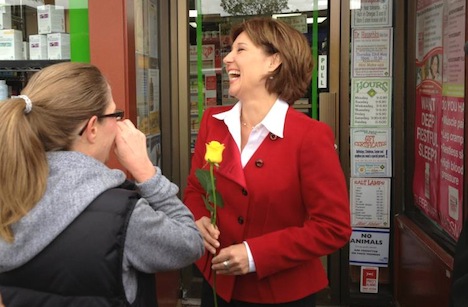The incumbent British Columbia Liberal Party, under the leadership of premier Christy Clark in her first provincial-wide election, has held on to power for a fourth consecutive government, despite the fact that the British Columbia New Democratic Party was heavily favored throughout the campaign to win the election.![]()
![]()
This was definitely a surprise, given that the BC NDP was leading by nearly 20 points two months ago, and even though polls showed a narrowing race in Canada’s third-largest province, forecasters still believed the BC NDP a heavy favorite just a day ago that showed a narrowing race in Canada’s third-largest province. No poll showed the BC Liberals leading this race, though polls showed Clark narrowing the gap against BC NDP opposition leader Adrian Dix.
As of around 1:15 am EST on Wednesday morning, the BC Liberals have been elected to 45 seats and were leading in 51 seats, while the BC NDP had been elected to 27 seats and leading in just 32. Andrew Weaver was set to become the province’s first Green Party legislator, with one independent rounding out the membership of the 85-seat provincial assembly. Given that the BC Liberals held 45 seats going into the election and the BC NDP held 36 seats, the BC NDP may well have lost seats on Tuesday.
In particular, former Vancouver mayor from 2005 to 2008, Sam Sullivan, was handily elected to a seat in the Vancouver-False Creek riding for the BC Liberals. Clark was leading, just slightly, in her own constituency in Vancouver Point Grey against a strong challenge from the BC NDP’s David Eby (NB: if Clark doesn’t win, it’s expected that a colleague will step down to allow Clark to win a speedy by-election).
It’s, of course, really bad news for Dix, whose leadership should almost certainly come to an end with Tuesday’s disastrous result. It’s really bad news for Thomas Mulcair, the opposition leader of Canada and federal NDP leader, who had embraced Dix and the provincial NDP in a way that federal Liberals had not embraced Clark and the BC Liberals.
It’s the second upset in as many years in western Canada — in Alberta in April 2012, nearly every pollster showed that another longtime incumbent party was set to lose power. But Alison Redford, the beleaguered incumbent premier, led her Progressive Conservative Party to victory against a challenge from Wildrose, a new party that had run both to the social and fiscal right of Redford.
So how did the BC Liberals do it? Here are four reasons that explain what happened Tuesday in British Columbia. Continue reading How the British Columbia Liberals managed to pull off such a stunning upset victory over the NDP

